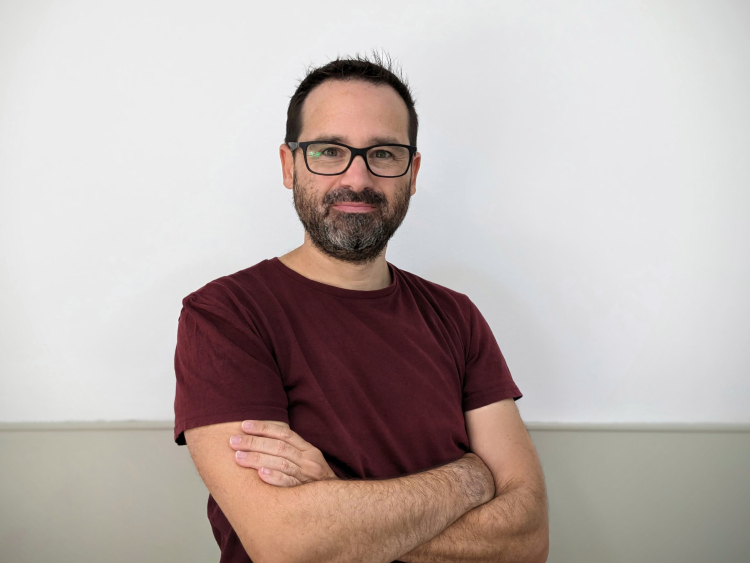Before you became a facilitator of the Point, did you travel the world with camera in hand?
Yes, I have worked as a videographer for Sexta in Barcelona and for TV3 in the Washington correspondent. Also as a freelancer I published photographs in different media on the trips I made to Vietnam, Russia, the Balkans, Mexico and Egypt.
"I approached Punt Òmnia to do a photo report and I was captivated by their projects"
And what leads you to convert?
It was accidental. It all started when I was stuck for two months while waiting to go to Washington for work. After a day, I met the former facilitator of this Point, David, and the I love la Mina project. I proposed to him to make a photographic report of the neighborhood. And from there, a closer relationship with David began and he gave me the opportunity to learn about everything that was done at the Punt Òmnia at the PES La Mina.
Then, after returning from Washington, we resumed these collaborations and I became part of what is called the Editorial Board of desdelamina.net. It is a community media outlet in the La Mina neighborhood and has just celebrated its twentieth anniversary! Since 2016 I was linked to the Punt Òmnia, but two years ago the facilitator left it and they encouraged me to present myself there. At the time, I liked the idea and said, come on, let's try it! And here I am!
Now as a facilitator, what are the biggest digital divides you see?
In my experience, without any diagnostics in hand, in general, we can say that the access gap is overcome, many users have a connection point. But we show that they do it directly on the mobile and have skipped the use through the computer. What we have detected and we need to work on is educating in the use of devices in a responsible manner.
What type of user approaches the Punt Òmnia?
This Punt Òmnia is part of the Social Education Platform that Salesians Sant Jordi has in La Mina. This gives us the opportunity to work very directly and easily with groups that are already linked to this organization and this social education center. We have groups of children and young people, who come to the center open to the study to do other types of activities and as a complement they pass by our Point at some point. We also have a user who is not linked to the entity, of an older age. And the age group of more than 30 years comes to us through the courses we take from the Employment Service of Catalonia.
In society everything is connected with technology, therefore there are many opportunities to work on ICT concepts. Our particular goal must be to be attentive and open to detect them.
What are your goals considering the challenges in the area?
We at Punt Òmnia share the same goal: to reduce digital gaps. In society everything is connected with technology, therefore there are many opportunities to work on ICT concepts. Our particular goal must be to be attentive and open to the different opportunities that may be presented to us, either by taking courses here, going out to find people, getting to know the activities of nearby institutes or making the 3D printer available to the neighborhood. In short, collaborate with the entities and collectives of the territory to lend a hand and help reduce the digital gap.
How do you become a winner in the Spanish educational robotics competition VEX IQ 2023?
The story begins with the former facilitator who opens a relationship with the nearby Technical University of Catalonia. When the institution commits to educational robotics, it starts a social program in which schools and educational centers participate. On the one hand, the UPC provides the starting material with which you can start these robot kits to start the design of the robot, etc. and on the other, an accompaniment of the university students who become volunteers in the centers and this has immense value! Young people have a point of reference a little older than them, and therefore it is easy for admiration and complicity to be generated. Another important aspect of the project is that every week we go to the UPC to train. Many times entering university is intimidating, but this approach breaks down barriers and shortens distances with these teenagers.
Our main goal is to make a team and teach how to make a robot, whether we win or not is completely secondary. But this year we had a surprise: we optimized and simplified our robot so much that it worked perfectly while the rest of the more sophisticated robots gave a lot of problems. And we won against all odds! It was very magical, we couldn't believe it, because usually our success was not coming last.
What do you like most about being a facilitator?
What attracts me the most is capturing opportunities. Be attentive to what is happening in the neighborhood, to possible needs and respond in the best way we think. Personally, I think we all take the same thing with us, which is the relationship with our users. Sharing experiences, sharing experiences, seeing progress, all this is very, very, very enriching!



